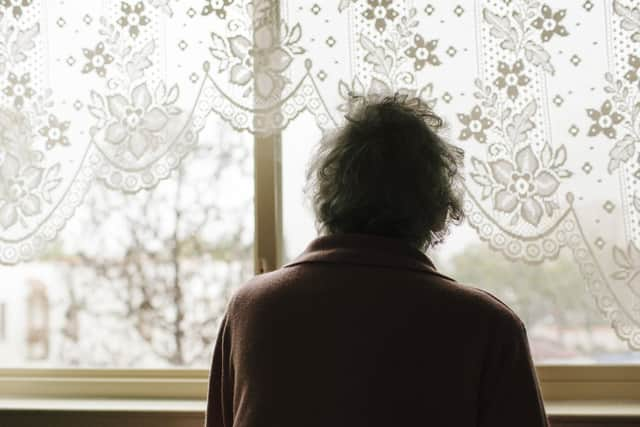As lockdown measures ease, we must think of those still isolating - Loneliness minister Baroness Barran
And as we start to move out of lockdown and gradually ease back into our normal lives, we must not forget people in vulnerable groups who might need to stay at home for longer.
For them, this risks being an even lonelier time.
Feelings of loneliness are not new – many of us experience them at some point in our lives – and before coronavirus struck, a lot of work was being done to raise awareness and support people.


Advertisement
Hide AdAdvertisement
Hide AdThe Yorkshire Post readers will be familiar with this paper’s long-standing campaign, which has helped lead the way in tackling the stigma of loneliness, and this time last year the Government launched our own campaign, #LetsTalkLoneliness, to encourage people to reach out and share their experiences.
Yet of late, we have all had no choice but to look loneliness in the eye. That may be because we have experienced it ourselves, or worried about friends and family who are living alone.
Last week the Prime Minister announced that single adult households – adults living alone or single parents with children under 18 – can now form a “support bubble” with one other household, meaning they can visit and stay overnight. I know this will be welcome news to many who have experienced loneliness.
As measures ease, we must think about people who are clinically vulnerable and still isolating. Those who are pregnant, aged 70 or older or with an underlying health condition are all advised to remain at home as much as possible. They still must take particular care to minimise contact with others outside their household or support bubble.


Advertisement
Hide AdAdvertisement
Hide AdThat’s why today (15 June), the start of Loneliness Awareness Week, we are encouraging everyone to write letters and cards to check in on friends and family.
Taking the time to write to one another – instead of firing off a quick email or text message – might be a slightly forgotten art but it’s more important than ever to connect with people, and putting pen to paper is an excellent way of making sure our friends, family and neighbours know we’re there for them.
Research from the Royal Mail shows that nearly three quarters of people (74%) feel that writing letters has positive mental health benefits. I will be writing to a friend who is in her 80s and is living alone, far from her children and grandchildren.
This week, thanks to our partnership with the Royal Mail and Post Office, a “Let’s Talk Loneliness” postmark will be stamped on letters to raise awareness.
Advertisement
Hide AdAdvertisement
Hide AdOf course, writing to each other is not the only way to reach out to friends and family. Technology has allowed us to connect with loved ones across the world, faster than ever before.
The Association for UK Interactive Entertainment (Ukie) is tackling loneliness by encouraging people of all ages to play games and quizzes together online for their Play And Talk weekend, on 20-21 June.
The Jo Cox Foundation’s Connection Coalition, a group of over 400 organisations ranging from small community groups to national bodies, has the More In Common Hour on Twitter where every Tuesday people can share their positive stories, remember happier times and look forward to things on the horizon.
Next weekend, around Jo Cox’s birthday, the foundation is running The Great Get Together, designed to connect communities through something as simple as having a cup of tea over the hedge, or chatting online or over the phone.
Advertisement
Hide AdAdvertisement
Hide AdI recently had the pleasure of talking to Kaneez Khan, from Near Neighbours in West Yorkshire, who shared with me the particular fears and pressures on people from BAME communities in her neighbourhood. Her organisation aims to bring people together from different backgrounds to create friendship and collaboration.
During the coronavirus outbreak they have continued their fantastic work, promoting online activities to support people self-isolating, helping local food-shares and clothes banks, and providing reassurance and friendship to groups across the region.
In Government, we recognise and are grateful for the heroic efforts of these individuals and organisations. Today, I am delighted to announce that nine organisations will receive a share of £5 million as part of a major effort to tackle loneliness, which was pledged as part of the Chancellor’s £750 million support package for charities.
The successful groups – which include the Armed Forces charity SSAFA and The English Football League Trust – are providing vital support for a range of vulnerable groups at risk of loneliness at this time, including the elderly, veterans, and people with disabilities.
Advertisement
Hide AdAdvertisement
Hide AdSmall and medium-sized charities in Yorkshire and across the country can also apply to the £200 million Coronavirus Community Support Fund, distributed by the National Lottery Community Fund, which is now open for applications.
Loneliness doesn’t discriminate, and I know from personal experience that understanding that many other people feel the way you do can be helpful in and of itself.
We all have a role in looking out for each other during this time – and so many people have been kind in a million small ways. Whether that’s writing a letter, picking up the phone, joining an online community or delivering shopping for neighbours. While the past few months have been hard for everyone, they’ve also shown the many ways in which a little distance can sometimes bring us closer together.
Editor’s note: first and foremost - and rarely have I written down these words with more sincerity - I hope this finds you well.
Advertisement
Hide AdAdvertisement
Hide AdAlmost certainly you are here because you value the quality and the integrity of the journalism produced by The Yorkshire Post’s journalists - almost all of which live alongside you in Yorkshire, spending the wages they earn with Yorkshire businesses - who last year took this title to the industry watchdog’s Most Trusted Newspaper in Britain accolade.
And that is why I must make an urgent request of you: as advertising revenue declines, your support becomes evermore crucial to the maintenance of the journalistic standards expected of The Yorkshire Post. If you can, safely, please buy a paper or take up a subscription. We want to continue to make you proud of Yorkshire’s National Newspaper but we are going to need your help.
Postal subscription copies can be ordered by calling 0330 4030066 or by emailing [email protected]. Vouchers, to be exchanged at retail sales outlets - our newsagents need you, too - can be subscribed to by contacting subscriptions on 0330 1235950 or by visiting www.localsubsplus.co.uk where you should select The Yorkshire Post from the list of titles available.
If you want to help right now, download our tablet app from the App / Play Stores. Every contribution you make helps to provide this county with the best regional journalism in the country.
Sincerely. Thank you.
James Mitchinson
Editor
Comment Guidelines
National World encourages reader discussion on our stories. User feedback, insights and back-and-forth exchanges add a rich layer of context to reporting. Please review our Community Guidelines before commenting.